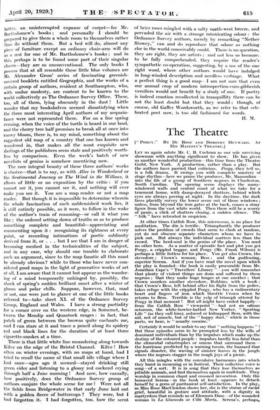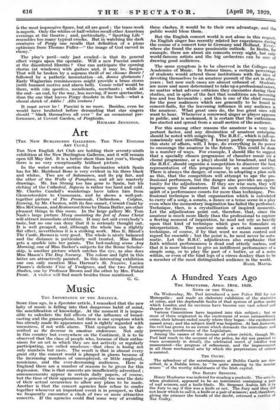The Theatre
[" PORGY." BY Du BOSE AND DOROTHY HEYWARD. AT HIS MAJESTY'S THEATRE.] LET us again salute Mr. C. B. Cochran as our sole surviving showman with anything significant to show. He has given us another wonderful production—this time from the Theatre Guild, New York. A production, rather than a play. But the authors have parried that criticism. Porgy,-they tell us, is a folk drama. It swings you with complete mastery of stage rhythm—here we praise the producer, Mr. Mamoulian- into the life of a group of Southern negroes in Charleston, South Carolina. The opening scene displays the many- windowed walls and central court of what we take for a tenement house, with damp-decayed shutters, behind which eyes are always peering at night. In the daytime, the dark faces placidly survey the lower scene out of those windows ; unless, from beyond the iron gates at the back, conies a stray figure from the vast white world. Then there will be a scurry of panic, a click of shutters closing, a sudden silence. The " folk " have retreated- in suspicion.
At other times Catfish Row, this microcosm, is no place for meditation. The din is terrific. Triumphantly the producer solves the problem of crowds that seem to clash at random, yet do not obscure separate characters whom we have to pick out. But always the individual matters less than the crowd. The herd-soul is the genius of the place. You need no other hero. As a matter of episodic fact and plot you get Porgy, a crippled beggar, and Porgy (Mr. Frank Wilson) is perhaps a little listless for his place. You get also Crown, the
stevedore ; Crown's woman, Bess; the godfearing, superior Serena. And if you have read the novel upon which the play is founded—the book is easily procurable from Mr. Jonathan Cape's " Travellers' Library "—you will remember that plenty of violent things are done and suffered by these negroes ; that they make huge lunges at one another ; that Crown murders another stevedore,. Robbins, with a hook ; that Crown's Bess, left behind after his flight from the police, takes refuge with the crippled Porgy, who has a rudimentary heart and fingers of iron which throttle Crown when he returns to Bess. Terrible is the yelp of triumph uttered by Porgy in that moment ! But all might have ended happily— from the Catfish Row " viewpoint "—had not an odious octoroon, the white-bowler-hatted New Yorker, " Sporting Life " (as they call him), seduced or kidnapped Bess, with the aid, not of muscle, but of the " happy dust, which in those parts, we hear, is " usually cocaine.
Certainly it would be unfair to say that " nothing happens " ! But these episodes seem to be prompted less by the wills of dominant individuals than by the impulses which make up the destiny of the coloured people : impulses hardly less fatal than the elemental catastrophes or omens that surround them— the hurricane predicted by a warning tocsin, the buzzard that signals disaster, the waving of sinister leaves in the jungle where the negroes stagger in the rough joys of a picnic.
All this mingles with the convulsive harmonies into which they burst in mourning or in festival. Their collective voice is song—of a sort. It is in song that they lose themselves as pitiable animals, and find themselves again in multitude. They worship in common chant and crooned invocation. Only the bereaved Serena—in the book at least—appears to detach herself by a germ of puritanical self-satisfaction. In the play, as Miss Rose MacClendon shows her, she is the statue of racial grief, beautiful in gesture and attitude, with a dignity in martyrdom that reminds us of Eleanore Duse—of the wounded -adman in La Gioconda 'or Cilia Marta. Serena's, perhaps,
is the most impressive figure, but all are good ; the team-work is superb. Only the whites or half-whites recall other American evenings at the theatre ; and, particularly, " Sporting Life " resembles too many typical crooks. But in watching the dark creatures of Porgy one recalls that definition of a pious optimism from Thomas Fuller—" the image of God carved in ebony."
The play's peril—only just evaded—is that its general effect verges upon the operatic. Will a new Puccini snatch at the disordered libretto ? One can anticipate the opening chorus (at windows) with guitars and, it may be, banjos. That will be broken by a soprano thrill of mi chiamo Bessie I followed by a pathetic lamentation—ah, donna sfortunata ! Early Wagnerian reminiscences might provide a brass storm (with buzzard motive and alarm bell). Comic relief would be there, with vita sportiva, mendicants, merchants ; while at the end—an end, by the way, less moving, if more spectacular, than the one that leaves Porgy desolate in the book—what a choral shriek of Addio ! Alla ventura !
It must never be ! Puccini is no more. Besides, even he would have hesitated before demanding that star singers should " black themselves all over " for an occasional per- formance, at Covent Garden, of Porghiello.
RICHARD JENNINGS.

























































 Previous page
Previous page